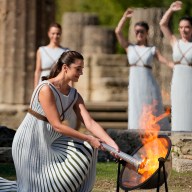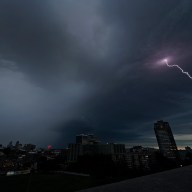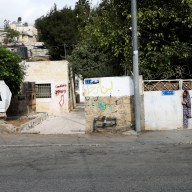 Danny Leclair (C) and Aubrey Loots (R) become the first same sex couple to marry in the 125th Rose Parade in a service performed on the AIDS Healthcare Foundation float in Pasadena, Calif. Credit: Reuters
Danny Leclair (C) and Aubrey Loots (R) become the first same sex couple to marry in the 125th Rose Parade in a service performed on the AIDS Healthcare Foundation float in Pasadena, Calif. Credit: Reuters
A gay Los Angeles couple exchanged wedding vows atop a flower-covered float trundling through Pasadena on Wednesday as part of the nationally televised Tournament of Roses Parade, capping a momentous year for same-sex marriage in the United States.
The nuptials of Danny Leclair, 45, and Aubrey Loots, 42, who have been together for 12 years and own a local chain of hair salons, marked the first same-sex marriage on a Rose Parade float in the 125-year history of the annual event, organizers said.
In the past, two heterosexual couples have tied the knot during Rose Parades – in 1989 and last year.
Leclair and Loots made it official aboard a float shaped like a wedding cake coated in white coconut chips, accented with red kidney beans and festooned with 12,000 roses and other floral decorations, said Ged Kenslea, a spokesman for the AIDS Healthcare Foundation.
The foundation sponsored the float to celebrate same-sex marriage and the role it can play in helping to reduce new HIV infections among gay men, he said.
The minister who performed the wedding, Alfreda Lanoix, an openly lesbian reverend for the Unity Fellowship Church of Christ, tossed handfuls of rose petals into the air to mark the completion of the ceremony.
The parade was witnessed by an estimated 700,000 spectators who lined the 5 1/2 mile procession route and by millions of viewers tuning into one of several networks carrying the event live in the United States and broadcasting it around the world. The parade also was live-streamed over the Internet.
WEDDING FLOAT TAKES THE CAKE
The wedding float ended up winning the tournament’s Isabella Coleman Award for “best presentation of color and color harmony through floral use.”
In the parade procession, the wedding float was in a lineup that included a high school marching band from Reno, Nevada, a float sponsored by the city of Beverly Hills, and another float sponsored by the Lutheran Laymen’s League featuring a banner that said: “Jesus Welcomes All.”
Joining the newlyweds on the float was a married lesbian couple, Sharon Raphael and Mina Meyer, who have been together 42 years, Kenslea said.
Loots, who is originally from South Africa, and Leclair, a native of Canada, met at a Los Angeles nightclub and originally had planned for a relatively low-key wedding until the opportunity to exchange vows in the Rose Parade surfaced.
“For me, I was moved by the stand that the AIDS Healthcare Foundation was taking,” Leclair told Reuters on Monday.
Loots said he had been traveling when he got a message from his partner asking if he would want to get married on a Rose Parade float.
“I said, ‘You’re crazy! Of course, let’s celebrate our love in front of the world,'” he recounted, adding that the couple were also motivated by the chance to offer hope to same-sex couples who in most states are still denied marriage rights.
“Being on top of this cake floating down the road is truly for the men and women in the world that don’t have these opportunities,” he said.
Wednesday’s event comes at a time of increasing momentum for the cause of gay marriage in the courts, at the ballot box and in statehouses across the United States.
As of this month, same-sex matrimony has been legally recognized in 18 states and the District of Columbia, with the tally more than doubling during the past year, due in most cases to litigation over the issue.
The trend has gained steam since the U.S. Supreme Court ruled in June 2013 that married same-sex couples are eligible for federal benefits, striking down a key part of the 1996 federal Defense of Marriage Act.
In a separate decision the same day, the high court let stand a lower-court ruling that overturned California’s voter approved ban on gay marriage as unconstitutional.













